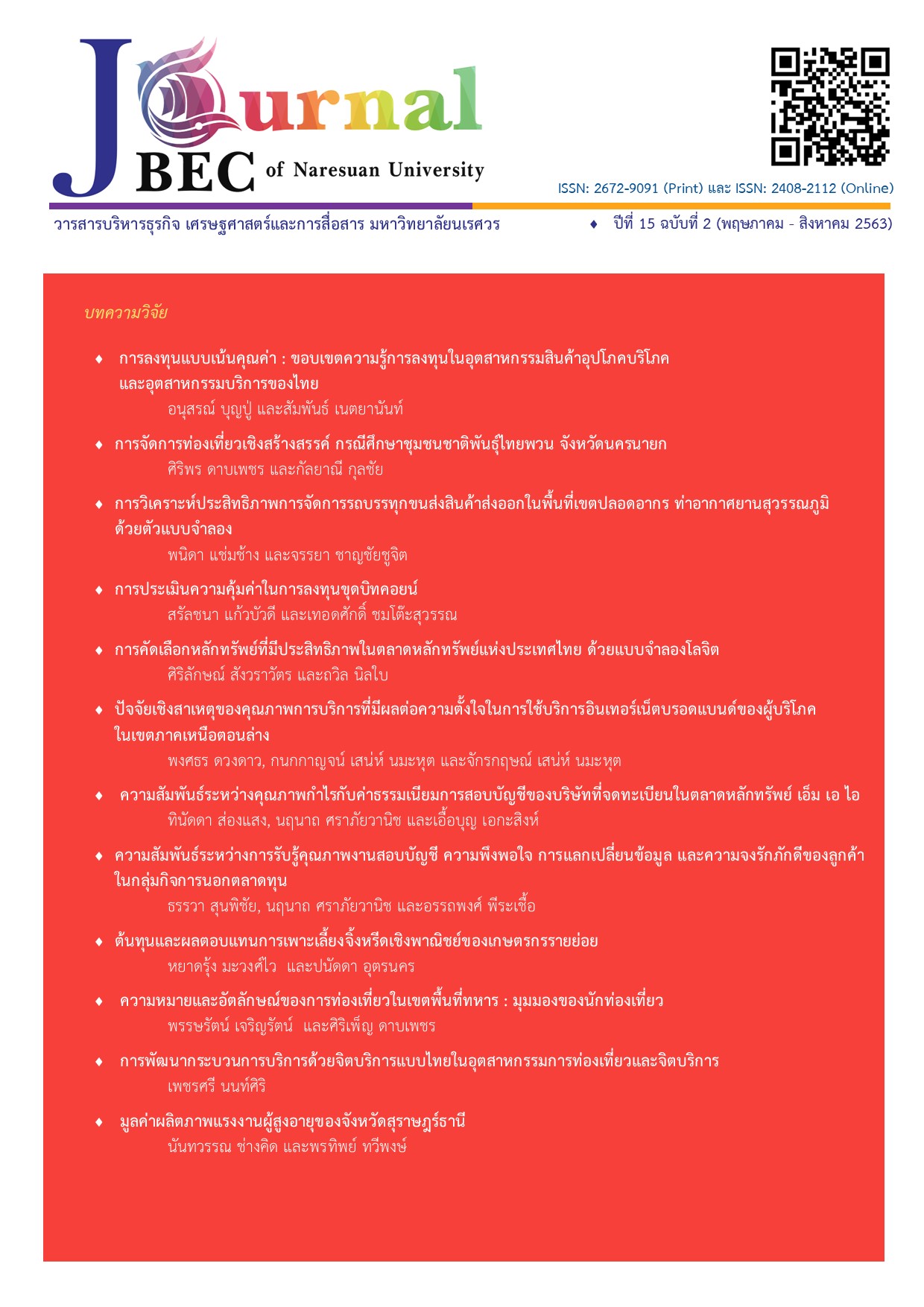การพัฒนากระบวนการบริการด้วยจิตบริการแบบไทยในอุตสาหกรรมการท่องเที่ยวและจิตบริการ
Main Article Content
บทคัดย่อ
การวิจัยนี้มุ่งศึกษากระบวนการบริการด้วยจิตบริการแบบไทยของธุรกิจในอุตสาหกรรมการท่องเที่ยวและจิตบริการ 4 ประเภท ได้แก่ ธุรกิจที่พัก ธุรกิจบริการอาหารและเครื่องดื่ม สถานบริการเพื่อสุขภาพ ธุรกิจนำเที่ยว
มีวัตถุประสงค์เพื่อ 1) เพื่อศึกษารูปแบบการส่งมอบบริการด้วยจิตบริการแบบไทย 2) เพื่อเสนอแนวทางพัฒนากระบวนการบริการด้วยจิตบริการแบบไทย การศึกษานี้ เป็นการวิจัยเชิงคุณภาพ ใช้วิธีการสัมภาษณ์
เชิงลึกและการสนทนากลุ่มย่อยร่วมกับผู้ประกอบการและผู้มีส่วนได้ส่วนเสียทางการท่องเที่ยวจำนวน
185 คน และการสังเกตการณ์ในสถานประกอบการจำนวน 72 แห่ง การวิเคราะห์ผลใช้วิธีการวิเคราะห์เนื้อหา
ผลการศึกษาพบรูปแบบการส่งมอบบริการ 3 รูปแบบ คือ 1) การส่งมอบบริการผ่านพนักงาน 2) การส่งมอบบริการผ่านภูมิทัศน์บริการ และ 3) การส่งมอบบริการผ่านสินค้าและขั้นตอนการให้บริการ ผลการศึกษานำไปสู่แนวทางในการพัฒนากระบวนการบริการด้วยจิตบริการแบบไทย คือ 1) พัฒนาพนักงานให้เกิดจิตวิญญาณในการให้บริการทั้งการพัฒนาจากภายในสู่ภายนอก และการพัฒนาจากภายนอกสู่ภายใน 2) บริหารประสบการณ์ลูกค้าด้วยกลยุทธ์
3 ประการ คือ 1) การให้บริการลูกค้าแบบเฉพาะเจาะจง 2) การร่วมสร้างสรรค์คุณค่า และ3) การร่วมสร้างจิตสำนึกต่อสังคมและสิ่งแวดล้อม
คำสำคัญ: 1) การส่งมอบบริการ 2) จิตบริการแบบไทย 3) อุตสาหกรรมการท่องเที่ยวและจิตบริการ 4) ภูมิทัศน์บริการ
Article Details
เอกสารอ้างอิง
Bell, D. (2008). Tourism and Hospitality. The Sage Handbook of Tourism Studies. pp.19-33.
Bitner, M.J. (1992). Servicescapes: The impact of physical surrounding on customers and employees. Journal of Marketing (56)2, 57-71.
Bowie, D., Buttle, F., Brookes, M., Mariussen, A. (2017). Hospitality Marketing. London: Routledge, https://doi.org/10.4324/9781315682549
Brotherton, B. (1999). Towards a definitive view of the nature of hospitality management. International Journal of Contemporary Hospitality Management 11(1), 165-173.
Brymer, R. (1995). Hospitality Management: An Introduction to the Industry. Dubuque, IA: Kendall/Hunt Publishing.
Buddhabhumbhitak, K. (2019). The Development of Thai Hospitality Competency for Personnel Development in Tourism and Hospitality Industry, Final Report. Thailand Research Fund. Bangkok, Thailand.
Burgess, J. (1982). Perspective on gift exchange and hospitable behavior. International Journal of Hospitality Management, 1(1), 49-57.
Cassee, E. H. a. R., R. . (1983). Hospitality in Hospitals in The Management of Hospitality. Oxford: Pergamon.
Chang-Hua, Y., Hsiu-Yu, T., Ko-Yu, C., & Nien-Chi, H. (2019). Restaurant Innovativeness, Customer Engagement And Value Co-Creation Behaviors. Proceedings of the Multidisciplinary Academic Conference, pp. 206-210.
Cole, G. (2017), Increasing customer loyalty: the impact of corporate social responsibility and corporate image. Annals in Social Responsibility, 3(1), 59-61.
Cuesta-Valino, P., Rodriguez, P. G., Nunez-Barriopedro, E. (2019). The impact of corporate social responsibility on customer loyalty in hypermarkets: A new socially responsible strategy. Corporate Social Responsibility and Environmental Management, [s. l.], (4), 761.
Dabphet, S. (2020). The Search for Thai Hospitality Dimensions in Hospitality and Tourism Industry. Journal of Community Development (Humanities and Social Sciences) 13(2).
Daengbuppha, J.(2010). Thai Hospitality Development to enhance competitiveness in T and H industry, Final Report. Thailand Research Fund. Bangkok, Thailand.
David Bowie, F. B., Maureen Brookes, Anastasia Mariussen. (2017). Hospitality Marketing (3rd ed.). New York: Routledge.
Field, J. M. (2012). Designing Service Processes to Unlock Value.
Geetz, C. (2000). The interpretation of cultures: Selected essays. New York, Basic Books.
Gillespie, C. H. (1994). Gastrophy and Nouvelle Cuisine: Entrepreneurial Fashion and Fiction. British Food Journal, 96(10), 19-23.
Goodenough, W. H. (1971). Culture, language and society. Reading, MA, Addison Wesley Modular Publications
Hemmington, N. (2007). From Service to Experience: Understanding and Defining the Hospitality Business. The Service Industries Journal, 27(6), 747-755. doi: 10.1080/02642060701453221
Jayawardena, C. (2000). International Hotel Manager. International Journal of Contemporary Hospitality Management, 12(1), 67-69.
King, C. A. (1995). What is hospitality? International Journal of Hospitality Management 14 (3), 219-234.
King O. (2009). What is Service Design? Touchpoint. The Journal of Service 1(1), 22-23.
Komin, S. (1990). The Psyvhology of the Thai People: Value and Behavioral Patterns. Ph.D. Thesis, Research Center of National Institute of Development Administrative (NIDA), Bangkok, Thailand.
Lashley, C., Morrison, A. (2000). Search of Hospitality; Theoretical Perspectives and Debateos. Oxfrd.
Kyongsill L., Kyung-won C., Ki-Young N., (2013). Orchestrating Designable Touchpoints for Service Businesses, Wiley-Blackwell DMI Fall, pp.13-21.
Mohr L.A., Bitner M.J. (1995). The role of Employee Effort in Satisfaction with Service Transactions.” Journal of Business Research 32(3), 239-252.
Nate-Tra Dhevabanchachai (2016). Service mind, Behavior and how to be Excellent. 13 may 2016 retrieved from https://mai-bs.com/blog/service-mind-behaviour-and-how-to-be-excellent/
Sampson, S.E., C.M. Froehle. (2006). Foundation and Implications of a Proposed Unified Services Theory. Production and Operation Management, 15 (2), 329-343
Sampson, S. (2010). A Unified Service Theory pp. 31-47.
Senchad, W., Nonsiri, P.(2019). A study of Servicescape Design with Local Culture in Hotel Business, Chiang Mai Province. E-Proceedings of the 1st International Conference, Tourism and Humanities: Tourism in a transformatives Era, 19-20 December 2019. Chaing Mai University, Thailand: pp.540-559.
Shostack, G. L. (1984). Designing services that deliver. Harvard Business Review, 62(1), 133-139.
Slattery, P. (2002). Finding the Hospitality Industry. Journal of Hospitality, Leisure, Sport and Tourism Education, 1(1), 19-28.
Tax SS, Stuart I. (1997). Designing and Implementing New services: The Challenges of Integrating Service System. Journal of Retailing 73(1), 105-134.
Thompson, D. F. (1996). The Oxford quick reference dictionary. Oxford, England: Oxford University Press.
Wattanacharoensil, W., Kobkitpanichpol, B.(2014). Asian hospitality: how emotional intelligence and organisational service culture play a role: Development of Regional Tourism by collaboration between public sector and academics in the Asia Pacific region. Proceedings of 2014 APTA Conference, Hochiminh City, Vietnam, Asia Pacific Tourism Association (2012).
Winsted, K. (1997). The Service Experience in Two Cultures: a Behavioral Perspective. Journal of Retailing, (73), 337-360. doi: 10.1016/S0022-4359(97)90022-1.


